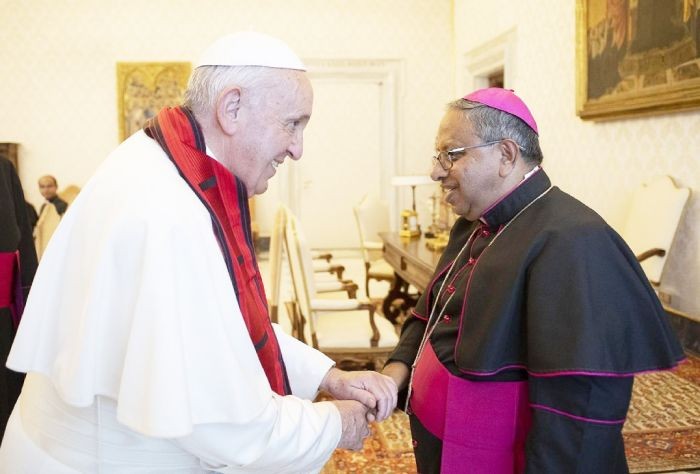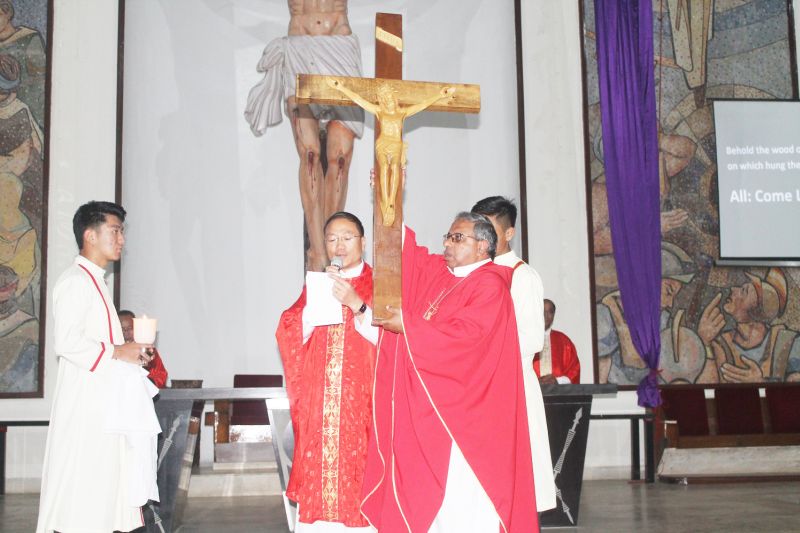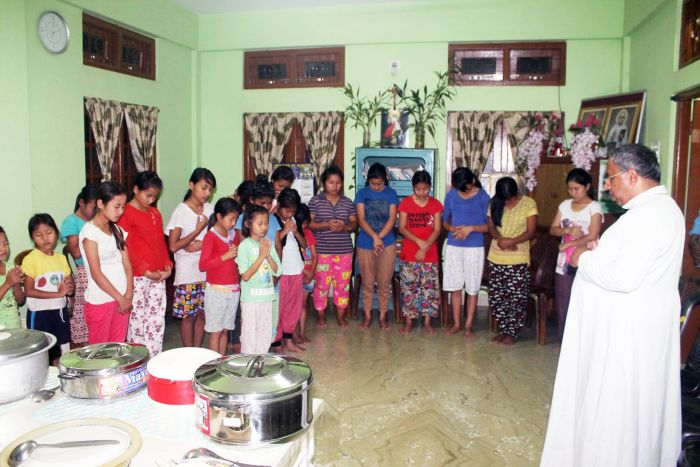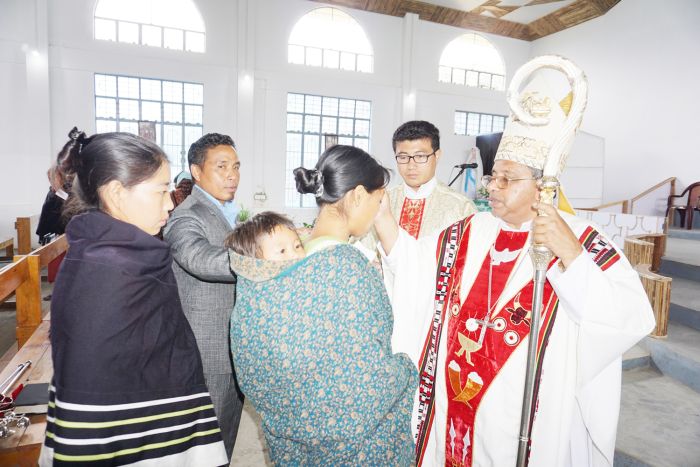Rev Fr James Thoppil, Bishop of Kohima Diocese meeting with His Holiness Pope Francis at Vatican City in May 2019.


Morung Express News
Kohima | February 5
“I dream big for my people of Nagaland”, says Rev Fr James Thoppil, Bishop of Kohima Diocese, who observes that the Naga society had great values such as honesty, hard work, sincerity, equality, hospitality, transparency and openness, which they practiced for ages, even before they became Christians. Unfortunately, he points out, ‘instead of fortifying and strengthening these values, we have lost them.’
He firmly believes that “unless one changes one’s life in sincere repentance and reparation of life, we have no hope a better future.” “The gospel of prosperity must give way to gospel of Christian values and principles” in his words.
In this series of Beyond Pulpit, Rev Fr James Thoppil, whose childhood dream was to become a policeman, but as destiny would have it, later responded to a higher calling and never regretted his decision to become a priest, talks about the foundational beliefs of Catholicism, his hopes and aspirations for Nagaland, having served here for a relatively long time.

Rev Fr James Thoppil, Bishop of Kohima Diocese and other ministers during the Good Friday service in 2018.
MExN: How did you discover your calling to become a priest? Did you ever consider another career?
Rev Fr James Thoppil: My childhood dream was to become a policeman as I was attracted by the dress and power.
When I shared my desire with my mother (I lost my father when I was just 3 years old) she told me that she would be happier if I become a priest. Thus, the seed of vocation to priesthood was planted in me. Also, my mother told me that as a child, I was affected by some sort of polio that prevented me from walking. I could only crawl. My dad made a concoction of some herbs, prescribed by a country doctor, which he thought would heal me, although he was warned that one who makes such a concoction would have some bad effect. But he was not afraid and said that he won’t mind what happens to him, provided me, his son is healed and able to walk. Sadly after a week of giving the medicine, my dad died in a freak accident (falling from a tree). My brother helped to complete the course of medicine, because of which, all believe I was healed and was able to walk at the age of 3.
For my high school studies, I was sent to a government school and there I lost interest in becoming a priest, although I was still very active in the Holy Childhood Association (Mission League) in the parish. Consequently, I did not take my studies seriously, but made a promise if I pass the class 10 exams in the first attempt that I will join the seminary. In fact, I did not prepare for my examinations because I wanted to fail. To my surprise and that of my siblings and teachers, I passed the examination, one among the 33 students who passed from the 340 students who wrote the exam from our school. After the result many suggestions came about my future – joining for Pre-Degree program, joining the Navy since an acquaintance of ours was already in the Navy, etc.
Fr OC Abraham, who hails from the same parish as mine, from the then diocese of Kohima-Imphal came to recruit boys who wanted to become missionary priest and when he asked me whether I wanted to become priest, I simply said yes.
Then he told me to come to his house with my mother to get her consent and arrange for the journey. When I told my mother, she would not agree, saying that she had only two sons and she would not allow one to become priest. So also my brother, who was like a father to me after the death of my father, was also not happy with my plans. But I prevailed over them and my mother after two days came with me to meet Fr Abraham and arrangements were made to travel to Assam. I had no idea where Assam was, much less where the diocese of Kohima-Imphal was. Anyway, with other 33 companions I reached St Joseph Seminary, Dibrugarh on July 11, 1974. But I was not happy there. I missed my home. I longed and cried for six months to return home but there was no possibility. After about six months of stay there I got used to and went ahead with my studies and training. From Dibrugarh I went to Christ King College, Shillong.

At Chavara Home in 2017.
The real crisis about my vocation came when I completed my graduation and philosophical studies. Many of my companions left. There was also a lot of pressure from my peer group and my family members to give up the studies for priesthood. So I decided to leave and arranged a job in Arunachal Pradesh. There were also few proposals for marriage and migration to the US. I informed Fr Rector about my decision to discontinue by studies to priesthood. He advised me not to take decision hurriedly but think and pray over it and take a decision only after proper discernment. Since there were many days of gap between our BA examinations, the annual retreat was arranged during the longest gap. It was animated by a priest from Mumbai. During the retreat, particularly during the daily adoration of the Blessed Sacrament, I was much disturbed and many questions and doubts came to my mind. A voice within me confronted me daily: “Why do you want to discontinue? You can do nothing without me. What you want to do, I will do for you.” In fact, a week before, one day as I was returning after the examination, I was almost run over by a speeding car in front of Don Bosco and St Anthony College, Shillong. When I shared these thoughts with the Rector and the Retreat Animator, they suggested rethinking about my decision to discontinue my studies to priesthood. After much prayer and reflection I decided to reverse my decision to discontinue my studies to priesthood. Since then I never looked back nor regretted my decision to become a priest and the Lord blessed me with blessings after blessings.

At Zhavame village.
MExN: What are the foundational beliefs of Catholicism?
Rev Fr James Thoppil: The foundational beliefs of the Catholicism are what the Church believed from its beginning, which are clearly articulated in the Nicene- Constantinople creed. The basic content of the creed is about the Trinitarian God, the respective redemptive roles of each of the three persons of the Trinity, the nature of the Church (one, holy, catholic and apostolic), communion between the living and dead, forgiveness of sins, resurrection and life everlasting. The Catholic Church believes in scripture and tradition, sacramental system and hierarchical nature of the Church.
MExN: How would you describe the Catholic philosophy of worship?
Rev Fr James Thoppil: Worship is something that we human beings, made in the image and likeness of God, offer to God to show our submissiveness and thankfulness to God, the Almighty, by which we will come to know Him, love Him and serve Him. It is the public or private expression of faith in God. There are three primary contexts of worship in the Catholic Church: liturgical, para-liturgical and devotional.
The Catholic Church sees the liturgy as the source and summit of all Her activity. Liturgy is the entire public worship of the Church, which has specific rules and guidelines, especially the celebration of the Eucharist, the divine office, and the sacraments.
Para liturgical worship is the worship offered to God outside the liturgy, in the context of Eucharist, word of God, etc.
Devotional Worship is worship that is not within the context of a “liturgy” and it can be private, or public, such as small prayer groups, cult of the saints or novenas, private prayers, pilgrimages, processions, the Stations of the Cross, wearing of medals, rosary, etc.
MExN: Can you briefly take us through the Seven Sacraments of the Catholic Church?
Rev Fr James Thoppil: As remedy for sin, the divine grace of God is experienced by the believers through the seven sacraments – rites instituted by Jesus and practiced by His followers as acts of worship. Just as Jesus is both human and divine, the sacraments are visible signs that give divine grace they symbolize. Sacraments build up the body of Christ and offer worship to God. There are seven sacraments that touch all the stages and all the important moments of Christian life. There is a certain resemblance between the stages of natural life and the stages of spiritual life.
Baptism: It is the first and foundational sacramentthat symbolizes the death and resurrection of Christ, incorporate recipients into the Church in a bond of unity. Using water to represent this spiritual rebirth, the recipient is cleansed of sin and adopted into the family of God. (cfr. Mt 28:19 and made sharers in the mission of the Church. Catholic Church accepts all baptisms administered in the Trinitarian formula (of all Christian denominations) (cfr. Jn 3:5; 1Cor 1:16; Acts 2:41; 8:12-13; 10:48). Baptism seals the Christian with the indelible spiritual mark (character) of his belonging to Christ. It is not repeated and so there is no re-baptism in the Catholic Church. Those who join the Catholic Church from other Christian denominations and who are baptised in the Trinitarian formula are not re-baptised, are accepted by the recitation of the creed.
Confirmation: This sacrament is the culmination of the process through which the baptized is sealed with the gifts of the Holy Spirit and strengthened for service to the Body of Christ, to participate in the Church’s mission and imitate the love and service of Christ. (cfr. Acts 19:1-9; 8:14-17; 2 Cor 1:21). The essential rite of confirmation is anointing the forehead of the baptized with sacred chrism and word, be sealed with the gifts of the Holy Spirit. Like Baptism, Confirmation is given only once, for it too imprints on the soul an indelible spiritual mark (character). In the Latin rite, the ordinary minister of Confirmation is the Bishop.
Holy Eucharist: It is also known as the Holy Mass. Eucharist, through the bread and wine, represents the gift of the body and blood of Christ, given to us freely by God for the forgiveness of our sins. The Eucharist is the source and summit of the Christian life. As we share in this meal and sacrifice, we are privileged to adore the presence of the Lord (cfr. Mt 26:26-28; Jn 6:48-58; Acts 2:42; 1 Cor 10:16; 11:23-30). In the Eucharistic species of bread and wine, Christ is really, truly and consubstantially present. Only a validly ordained priest can preside at the Eucharist and consecrate the bread and wine so that they become the Body and Blood of the Lord. As a sacrifice the Eucharist is also offered in reparation for the sins of the living and the dead and to obtain spiritual or temporal grace from God. Anyone who desires to receive Christ in Eucharistic communion must be in the state of grace.
Penance: It is called the sacrament of conversion, confession, penance or reconciliation. It is the gift of reconciliation and healing when the recipient confesses his or her sins committed after baptism and receives absolution from the priest. God moves through the voice of the priest to embrace, forgive, and restore the individual, absolving him or her of sin and reconciling him or her with the Church. Sincere repentance, confession of sins and the intention to make reparation and reparation are most important aspect of penance. Frequent confession empowers one to grow closer to Christ and His body, the Church (cfr. Mt 18:18; 16:19; Jn 20:21-23; Acts19:18; 2 Cor 5:18-20). The spiritual effects of the sacrament are: reconciliation with God by which the penitent recovers grace; reconciliation with the Church; remission of the eternal punishment incurred by mortal sins; remission, at least in part, of temporal punishment resulting from sin; peace and serenity of conscience and spiritual consolation; an increase of spiritual strength for Christian life.
The Anointing of the Sick: Through this sacrament, a priest prays for recovery from illness. For the sick about to leave this earthly life, the priest prays that the recipient will have a strengthened soul as they bear the final burden of their illness. When received by the dying it is referred to by some as Last Rites; this sacrament absolves the recipient of any sin he or she has not confessed and unites his or her own suffering and dying to that of Christ and the hope of life eternal with Him (cfr. Jam 5:14).
Matrimony: This covenant of permanent union between a husband and wife displays Christ’s spousal love for His church. Symbolizing the sacrificial love of Christ, this sacrament calls husband and wife to love each other in the same way Christ loves the Church (cfr. Mt 19:3-9;Eph 5:21-33; Jn 2:1-12).By its very nature matrimony is ordered to the good of the couple and to the generation and education of children. Unity, indissolubility and openness to life are essential to marriage.
Holy Orders: This sacrament is given to bishops, priests and deacons, those called to serve the spiritual needs of those in Church after completion of sufficient spiritual and theological training (cfr. 2 Tim 1:6; Heb 5:1-5; 1 Pet 5:1-5). Through baptism all the faithful share in the priesthood of Christ. The ministerial priesthood differs in essence from the common priesthood of the faithful because it confers a sacred power for the service of the faithful. The ordained ministers exercise their service for the people of God by teaching, divine worship and pastoral governance.
MExN: What are the challenges you face as the Bishop in a small conflict-ridden state like Nagaland?
Rev Fr James Thoppil: The real challenge is to enable and encourage the people of Nagaland to live by what they profess and believe. In short to be a genuine Christian, in faith, in fact and in act. We say Nagaland for Christ, but how much of Christianity is there in Nagaland. There is a total dissect between faith and life today. This the real challenge.
The Naga society had great values, such as honesty, hard work, sincerity, equality, hospitality, transparency, openness, etc. which they practised for ages, even before they became Christians. Unfortunately, instead of fortifying and strengthening these values, we have lost them.I am sorry to say that the idea that one is saved by faith alone, however contrary one’s actual life in relations to genuine Christian values, absolution of one’s sins by giving tithe, etc has gone deep into the religious psychic of our people. Unless one changes one’s life in sincere repentance and reparation of life, we have no hope a better future.
MExN: In your opinion, are social issues and causes something the church should be involved in?
Rev Fr James Thoppil: The Church is part and parcel of the society. As Gaudium et Spes, the Second Vatican Council’s Pastoral Constitution on the Church in the modern world says, “The joys and the hopes, the grief and the anxieties of the men of this age, especially those who are poor or in any way afflicted, these are the joys and hopes, the griefs and anxieties of the followers of Christ” (GS 1). Therefore, the Church, the people of God, cannot shun or run away from the social issues facing the society, instead permeate it with Christian principles and values. Public servants and leaders must develop sense of social justice and responsibility.
MExN: What are the most frequent issues of conflict you observe among church members and how do you address them?
Rev Fr James Thoppil: The most frequent issues of conflict among the Church members are individualism promoted by materialism and hedonistic secularism. It seems that material gains and financial benefit are the prime motive in every decision of the individuals, society or the government. Most have lost vision for collective community welfare.
Immediate material benefit is yardstick for decisions and plans. One can address and eradicate these negative tendencies only by sincere conversion and repentance and resolve to live the Christian values and principles. As the saying goes, most people want fish but not willing to learn how to fish.
MExN: What aspects of ministry are you most passionate about and why?
Rev Fr James Thoppil: I am passionate about spiritual, pastoral and developmental growth of the people. As a pastor and leader I must feed, strengthen and nourish the spiritual and physical aspects of human life. Jesus did not only preach the word of God but intervened in their physical and material needs. In the same way the Church cannot limit itself to the pulpit instead it should involve into the lives of people. Christian must be light and salt to the society.
MExN: Can you share your experience of meeting His Holiness Pope Francis at Vatican City in May 2019?
Rev Fr James Thoppil: My visit to Rome and meeting His Holiness Pope Francis was part of an official visit to the Bishop to Rome, called Ad Limina visit in the Catholic Church, an ad limina visit is an obligatory visit made by all bishops to Rome during which they pray at the tombs of St Peter and St Paul. In addition, they meet with Pope and Vatican officials to report on the state of the diocese. It is a formal trip usually made together by all bishops from a single region. While the audience with Pope receives the most coverage, the spiritual heart of ad limina visit is Masses at the major churches of Rome: St Peter’s Basilica, St Paul Outside the Walls, St John Lateran and St Mary Major.
In addition, the bishops will meet with officials from many of the departments and offices in the Roman Curia. Therefore, my visit in 2019 was my first ad limina visit and was really a memorable one. I had met Pope Francis first time in 2006. I had also met two other previous popes, Pope Benedict XVI (2012) and Pope St John Paul II (many times). Every meeting with Pope is very elevating and enriching since Pope is the successor of St Peter, the Vicar of Christ on earth.
MExN: How do you live out your faith?
Rev Fr James Thoppil: Well, I try to live my faith by nourishing it with reading of the Scriptures and celebrating the sacraments, especially the Holy Eucharist. Liturgy of the hours (official prayer of the Church), private personal prayer and other devotional practices such as praying of the Rosaries, praying the divine mercy prayer, praying for the dead, adoration of Jesus present in the most Blessed Sacrament etc. are part of living my faith.
The other aspect of my living the faith is visiting the parishes (official – Pastoral visits and unofficial) planning and executing developmental activities in the various parishes and centres, finding resources for the overall growth and development of the people of Nagaland, etc. When official visits are made (pastoral visit) I visit every village where there is catholic community, pray with them especially by celebrating the Holy Eucharist. I also meet the community and village community and discuss how jointly we can plan and work for the development of the community and village.
MExN: With your priesthood spanning over 30 years, what would you say has been the most rewarding aspect of it?
Rev Fr James Thoppil: I have been a priest for the last 35 years and the greatest part of my priestly life was spent in the formation of candidates to priesthood. Therefore, there is great joy to meet priests who had been my students.
Another aspect of the joy of my priesthood is the fact that I was able to help people to grow – spiritually, materially, educationally and other ways and to see them being grateful for the little we are able to do for them.
MExN: Any final thoughts that you would like to share for our readers?
Rev Fr James Thoppil: I dream big for my people of Nagaland. If only we live by our faith and faith directing our life we would have grown much and developed better. We have much resources and talents, which are not utilized or wrongly channelled. We must take responsibility for our own life and life of our future generation. I don’t believe in the axiom, “one is saved by faith alone”. Faith must show in action (James 2: 17-26). We must forgive, repent and live by the values and principles of Christ and the Church. We must learn to practice the seven virtues (chastity, temperance, charity, diligence, patience, kindness and humility) to protect ourselves from the seven deathly sins (pride, greed, wrath, envy, lust, gluttony and sloth). Our spiritual life must be nourished by a sacramental life. True repentance calls for change of life. Mere church going and giving tithe will not save us neither in this world nor in world to come. The gospel of prosperity must give way to gospel of Christian values and principles.






